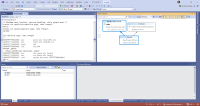Details
-
New Feature
-
Status: Closed (View Workflow)
-
Critical
-
Resolution: Fixed
Description
Multi-threaded Linux programs (like Firefox or MySQL since 8.0.27 or so) usually set a name for each thread. This name will appear in the output of top and other utilities and would help to answer questions like "What thread uses most of CPU" etc.
Consider this example of MySQL 8.0.29:
openxs@ao756:~/dbs/8.0$ for task in $(ls /proc/$(pidof mysqld)/task/); do name=$(cat /proc/$(pidof mysqld)/task/${task}/comm); echo "TASK: ${task} (${name})"; done
|
TASK: 567049 (mysqld)
|
TASK: 567079 (ib_io_ibuf)
|
TASK: 567080 (ib_io_log)
|
TASK: 567081 (ib_io_rd-1)
|
TASK: 567082 (ib_io_rd-2)
|
TASK: 567083 (ib_io_rd-3)
|
TASK: 567084 (ib_io_rd-4)
|
TASK: 567085 (ib_io_wr-1)
|
TASK: 567086 (ib_io_wr-2)
|
TASK: 567087 (ib_io_wr-3)
|
TASK: 567088 (ib_io_wr-4)
|
TASK: 567089 (ib_pg_flush_co)
|
TASK: 567096 (ib_log_checkpt)
|
TASK: 567097 (ib_log_fl_notif)
|
TASK: 567098 (ib_log_flush)
|
TASK: 567099 (ib_log_wr_notif)
|
TASK: 567100 (ib_log_writer)
|
TASK: 567114 (ib_srv_lock_to)
|
TASK: 567115 (ib_srv_err_mon)
|
TASK: 567116 (ib_srv_mon)
|
TASK: 567117 (ib_buf_resize)
|
TASK: 567118 (ib_src_main)
|
TASK: 567119 (ib_dict_stats)
|
TASK: 567120 (ib_fts_opt)
|
TASK: 567122 (xpl_worker-1)
|
TASK: 567123 (xpl_worker-2)
|
TASK: 567124 (xpl_accept-1)
|
TASK: 567893 (ib_buf_dump)
|
TASK: 567894 (ib_clone_gtid)
|
TASK: 567895 (ib_srv_purge)
|
TASK: 567896 (ib_srv_wkr-1)
|
TASK: 567897 (ib_srv_wkr-2)
|
TASK: 567898 (ib_srv_wkr-3)
|
TASK: 567899 (evt_sched)
|
TASK: 567900 (sig_handler)
|
TASK: 567902 (xpl_accept-3)
|
TASK: 567903 (gtid_zip)
|
For MariaDB (10.6 here for example) we get:
openxs@ao756:~/dbs/maria10.6$ for task in $(ls /proc/$(pidof mariadbd)/task/); do name=$(cat /proc/$(pidof mariadbd)/task/${task}/comm); echo "TASK: ${task} (${name})"; done
|
TASK: 568093 (mariadbd)
|
TASK: 568095 (mariadbd)
|
TASK: 568096 (mariadbd)
|
TASK: 568097 (mariadbd)
|
TASK: 568098 (mariadbd)
|
TASK: 568099 (mariadbd)
|
TASK: 568104 (mariadbd)
|
TASK: 568105 (mariadbd)
|
openxs@ao756:~/dbs/maria10.6$
|
See also https://bugs.mysql.com/bug.php?id=70858
It makes sense to use the same thread name as used in Performance Schema.
Attachments
Activity
| Field | Original Value | New Value |
|---|---|---|
| Assignee | Vladislav Vaintroub [ wlad ] |
| Fix Version/s | 11.4 [ 29301 ] |
| Status | Open [ 1 ] | In Progress [ 3 ] |
| Assignee | Vladislav Vaintroub [ wlad ] | Nikita Malyavin [ nikitamalyavin ] |
| Status | In Progress [ 3 ] | In Review [ 10002 ] |
| Assignee | Nikita Malyavin [ nikitamalyavin ] | Vladislav Vaintroub [ wlad ] |
| Status | In Review [ 10002 ] | Stalled [ 10000 ] |
| Fix Version/s | 11.5 [ 29506 ] | |
| Fix Version/s | 11.4 [ 29301 ] |
| Assignee | Vladislav Vaintroub [ wlad ] | Sergei Golubchik [ serg ] |
| Status | Stalled [ 10000 ] | In Review [ 10002 ] |
| Fix Version/s | 11.6 [ 29515 ] | |
| Fix Version/s | 11.5 [ 29506 ] |
| Priority | Major [ 3 ] | Critical [ 2 ] |
| Assignee | Sergei Golubchik [ serg ] | Vladislav Vaintroub [ wlad ] |
| Status | In Review [ 10002 ] | Stalled [ 10000 ] |
| Status | Stalled [ 10000 ] | In Testing [ 10301 ] |
| Assignee | Vladislav Vaintroub [ wlad ] | Lena Startseva [ JIRAUSER50478 ] |
| Link | This issue is part of TODO-4765 [ TODO-4765 ] |
| Issue Type | Task [ 3 ] | New Feature [ 2 ] |
| Labels | Preview_11.6 |
| Assignee | Lena Startseva [ JIRAUSER50478 ] | Vladislav Vaintroub [ wlad ] |
| Status | In Testing [ 10301 ] | Stalled [ 10000 ] |
| Attachment | screenshot-1.png [ 73815 ] |
| Attachment | screenshot-2.png [ 73818 ] |
| issue.field.resolutiondate | 2024-07-09 17:35:01.0 | 2024-07-09 17:35:01.187 |
| Component/s | Server [ 13907 ] | |
| Fix Version/s | 11.6.1 [ 29847 ] | |
| Fix Version/s | 11.6 [ 29515 ] | |
| Resolution | Fixed [ 1 ] | |
| Status | Stalled [ 10000 ] | Closed [ 6 ] |


Compared to MySQL, MariaDB has only few single purpose threads. There is timer thread, there is page cleaner thread, there is a main thread, that accepts connections, and nothing interesting otherwise. there can be a bunch of background threads, from a threadpool, that handle innodb background work, and a bunch of foreground threads, that handle user queries ( from thread pool or not). I'm wondering if you can gain much from such info